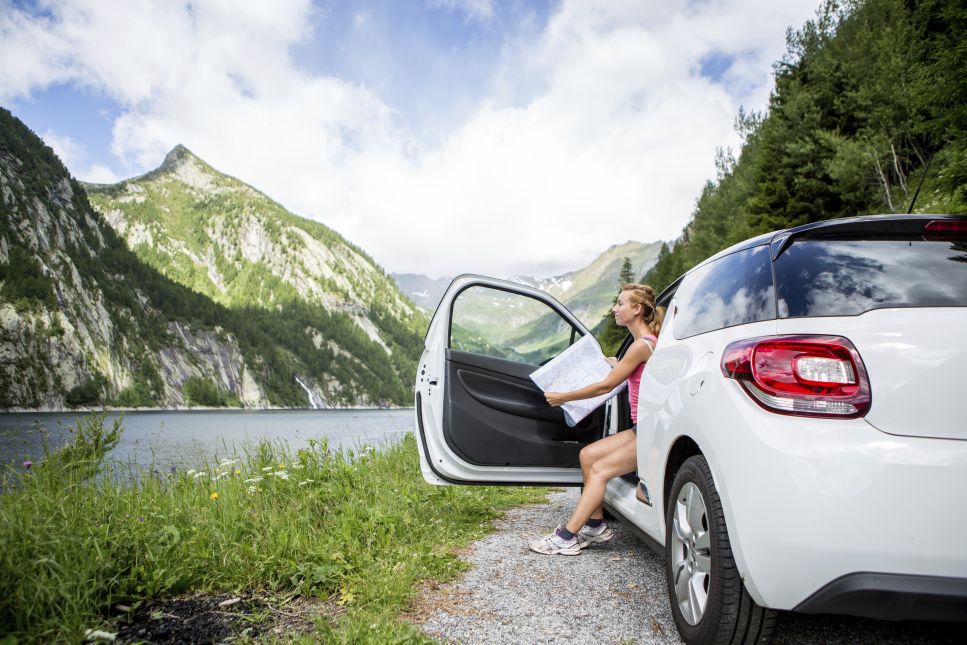Driving your own car to mainland Europe can be an appealing idea. On a Euro trip you can travel to wherever you need to be, whenever you like. However, there's little worse than getting stuck at the roadside in an unfamiliar country.
On top of the risk of a break down, various things need to be in good working order so that you don't end up getting in trouble with the law while you are driving abroad on holiday.
To avoid the chances of this happening, make sure you check the following things before you head out on the road in Europe.

Tyres
Among the things that could ruin your Euro trip holiday are a flat tyre or a blow out. Therefore, you need to make sure your tyres are in good condition so that they can withstand the journey.
Check your tyre pressure, the correct level for which can be found in your manufacturer's handbook. Not only will the correct tyre pressure reduce your chances of a flat but it will also reduce rolling resistance, which means your car will not use as much fuel.
Ideally, check your tyre pressure a couple of times before you leave and if you find that any need regular top ups then you might have a slow puncture.
Look at the overall condition of your tyres too and keep an eye out for lumps, bulges and tears as these mean that the structural integrity of the affected tyre is compromised. Driving on a tyre with these faults will considerably increase your risk of a blow out, which can be very dangerous.
Have a look at the tread on your tyres too as this is vital for traction and reducing braking distance. The 20p test is a simple way to do this; insert one of these coins into several different parts of the centre three-quarters of the tread. If the outer band is visible anywhere then your tread is too worn and it is time to change your tyres.
Engine oil
You should check your engine oil level before any long journey so you should certainly do so before driving to Europe.
Check your dipstick roughly every two weeks. If you notice that the oil consumption is particularly high then your engine may have a problem.
If you haven't had your oil and filter changed for a while then it is worth getting this done before driving abroad. Make sure the oil you use is to the correct specification.
Lights
Having working lights is a must, not only for safety around other drivers but also so that you don't run into trouble with the law while you are away on your Euro trip.
Make sure you check that all your lights are working, including headlights, rear lights, brake lights, indicators, side lights and fog lights. Clean them regularly too to increase visibility.
Water
When the engine is cold, check your coolant level and top it up if need be. It's useful to have a mixture of water and antifreeze in your system as this stops the coolant freezing in winter and can also help to prevent a build-up of corrosion too.
Have a look at your screenwash level too and top it up if need be.
Be sure to use a good screenwash additive as this will be much more effective at clearing some of the dirt on your windscreen.
Travel documents
You won't get very far without having your documents in order. Check that your passport is still in date as well as your driving licence. Do this months before your trip so that you have time to replace these documents if need be.
Travel insurance can also help to offer peace of mind that, should anything go wrong on your trip, that you are covered in line with the travel insurance policy terms and conditions.
Since January 2021, UK drivers have also been subject to new rules when driving in Europe.
Driving in Europe requirements
The rules for driving in Europe vary from country to country. However, what you will discover is that many countries in Europe have stricter regulations when it comes to driving than we have here in the UK.
Many countries require you to carry your insurance documents, registration documents and your driving licence at all times when driving.
A large number of European countries also require you to carry safety equipment, in case of a breakdown, For example, car drivers are required to carry a warning triangle in countries including France, Italy, Croatia, Spain and Belgium, whilst the necessity to carry a reflective jacket in your car is also a requirement in these European countries.
Your breakdown cover
Even after all your checks, you may still find that your car breaks down unexpectedly. In the event that this happens, you don't want to find that you are stuck at the roadside and nobody can tow your car as your breakdown cover doesn't stretch to mainland Europe.
Before you leave, check your policy to find out if you are covered.
Alternatively, you can book short term European cover from startrescue.co.uk.





